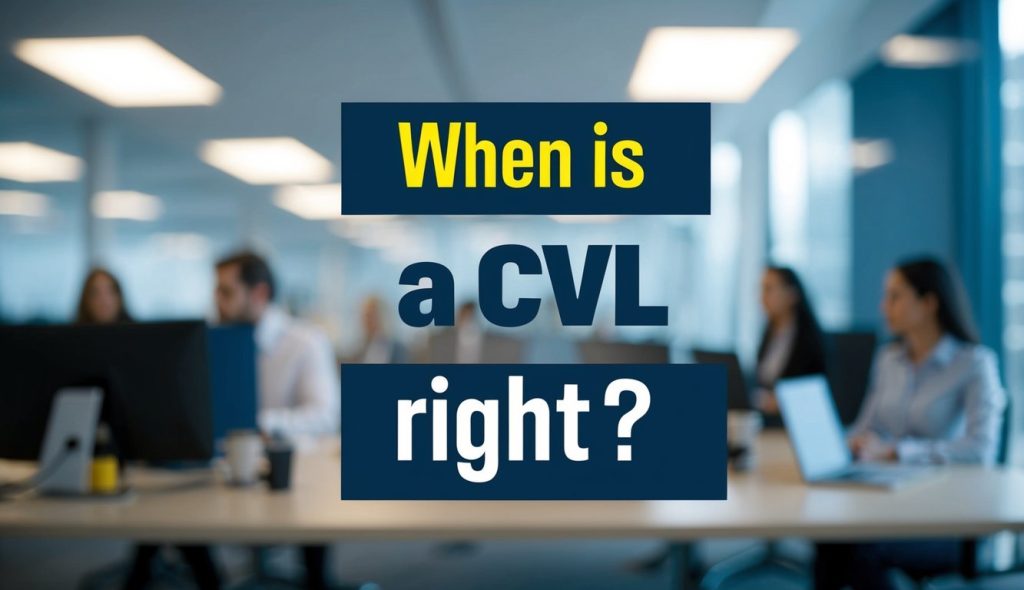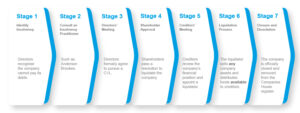
When Should a Company Consider a CVL (Creditors’ Voluntary Liquidation)? Key Signs and Timelines for Business Owners
Recognising The Signs Of Financial Distress
Financial distress often manifests through specific indicators that signal a company’s deteriorating financial health. Identifying these signs early can help you take timely action to address problems before they become insurmountable.
When Is It Time to Consider a CVL (Creditors’ Voluntary Liquidation)?
| Question | Quick Answer |
| What is a CVL? | A CVL is a formal insolvency process where directors choose to close an insolvent company, ensuring debts are managed legally and transparently. |
| When should directors consider a CVL? | Directors should consider a CVL when:
– The company is unable to pay its debts as they fall due (cash flow insolvency). – Liabilities exceed assets (balance sheet insolvency). – Creditor pressure, such as unpaid invoices or legal action, threatens the business. |
| What are the benefits of a CVL? | – Protects directors from personal liability (except for personal guarantees or misconduct).
– Ensures fair treatment of creditors. – Allows for an orderly wind-down of the business. |
| What are the warning signs a CVL is needed? | – Persistent cash flow issues.
– Mounting unpaid taxes, such as VAT or PAYE. – Creditors issuing statutory demands or winding-up petitions. – Difficulty meeting payroll. |
| Can a CVL help avoid director penalties? | Yes, initiating a CVL shows directors are acting responsibly, which reduces the risk of wrongful trading accusations or disqualification. |
| How does a CVL compare to other options? | A CVL is the best choice for insolvent companies that cannot recover. For solvent businesses, options like a Members’ Voluntary Liquidation (MVL) may be better. |
| What happens if directors delay action? | Delaying action can worsen the financial situation, increase creditor pressure, and risk personal liability for wrongful trading or misconduct. |
| Is a CVL the right choice for all insolvent companies? | A CVL is suitable when there’s no realistic chance of recovery. For businesses with recovery potential, restructuring options like CVAs or administration may be better. |
| How can Anderson Brookes help? | Anderson Brookes offers a free consultation to assess your company’s situation and recommend the best course of action, including CVLs, if appropriate. |
Free Consultation – advice@andersonbrookes.co.uk or call on 0800 1804 935 our freephone number (including from mobiles).
Consistent Cash Flow Issues
Cash flow problems are a key indicator of financial distress. You might notice:
- Difficulty meeting payroll obligations
- Delays in paying suppliers or creditors
- Frequent use of overdraft facilities
- Inability to cover day-to-day operational expenses
These issues can arise from various factors, such as declining sales, excessive overhead costs, or poor inventory management. If you’re consistently struggling to maintain positive cash flow, it’s crucial to review your financial strategies and consider seeking professional advice.
Increasing Pressure From Creditors
As financial difficulties mount, you may experience growing pressure from creditors:
- More frequent payment reminders and demands
- Threats of legal action or statutory demands
- Refusal to extend credit or supply goods
- Requests for personal guarantees on company debts
This pressure can severely impact your business relationships and reputation. If you’re facing heightened creditor pressure, it’s essential to communicate openly with your creditors and explore options for restructuring debts or negotiating payment plans.
Mounting Business Debts And Overdue Payments
Accumulating debts and overdue payments are clear signs of financial distress:
- Growing accounts payable balances
- Unpaid tax liabilities (VAT, PAYE, Corporation Tax)
- Defaulting on loan repayments
- Accumulation of late payment fees and interest charges
If your company is consistently behind on payments, it may be heading towards insolvency. You should carefully review your financial position, prioritise essential payments, and consider seeking professional advice to explore debt management options or potential insolvency procedures like CVL if the situation appears unrecoverable.
Google Reviews

&

How Insolvency Is Assessed
Assessing insolvency involves examining a company’s financial position and ability to meet its obligations. This process uses specific tests and looks for key indicators of financial distress.
Tests For Financial Insolvency
The cash flow test and balance sheet test are primary methods for assessing insolvency. The cash flow test examines whether a company can pay its debts as they fall due. If a company consistently struggles to pay creditors on time, it may be deemed insolvent.
The balance sheet test compares a company’s assets to its liabilities. If liabilities exceed assets, the company may be considered insolvent. This test includes contingent and prospective liabilities.
Insolvency practitioners often use both tests to get a comprehensive view of a company’s financial health. They may also review financial statements, cash flow forecasts, and creditor demands.
Indicators Of Unmanageable Debt Levels
Several signs can indicate a company is struggling with unmanageable debt:
- Consistent late payments to suppliers or HMRC
- Maxed out credit facilities
- County Court Judgments (CCJs) against the company
- Difficulty paying staff wages
- Requests for extended credit terms from suppliers
- Defaulting on loan repayments
Directors should also watch for declining sales, shrinking profit margins, and increasing overheads. These factors can contribute to cash flow problems and potential insolvency.
If you notice these signs, it’s crucial to seek professional advice promptly. Early action can open up more options for addressing financial difficulties and potentially avoiding liquidation.

Why Timing Is Crucial For CVL
Timing plays a vital role in the success of a Creditors’ Voluntary Liquidation (CVL). Acting promptly can protect your interests and minimise potential risks.
Avoiding The Risks Of Delayed Action
Delaying a CVL can lead to severe consequences for your company. As financial difficulties worsen, you may face legal action from creditors, including statutory demands or winding-up petitions. These actions can limit your options and control over the liquidation process.
Continued trading whilst insolvent puts you at risk of wrongful trading accusations. This could result in personal liability for company debts and potential disqualification as a director.
Delayed action may also deplete your company’s assets, leaving less for creditors and potentially damaging your reputation as a director.
Benefits Of Acting Promptly During Financial Challenges
Initiating a CVL early can offer several advantages. You maintain control over the process, choosing the liquidator and timing of the liquidation. This proactive approach demonstrates responsible leadership to creditors and stakeholders.
Early action preserves more company assets, potentially increasing returns to creditors. It may also protect your personal assets if you’ve provided personal guarantees for company debts.
Prompt CVL action can help you avoid accusations of wrongful trading. It allows for a more orderly wind-down of the business, giving you time to inform employees and customers properly.
By acting quickly, you can potentially negotiate better terms with creditors and reduce the overall stress of the liquidation process.
Free Consultation – advice@andersonbrookes.co.uk or call on 0800 1804 935 our freephone number (including from mobiles).
Situations Where CVL Is The Best Option?
A Creditors’ Voluntary Liquidation (CVL) can be the most appropriate course of action in certain critical situations for insolvent companies. It allows for an orderly closure while protecting directors from personal liability.
When Restructuring Or Refinancing Is Not Viable
If your company’s financial situation is beyond recovery, a CVL may be the best option. This typically occurs when:
- Your debts significantly outweigh your assets
- Cash flow problems persist despite cost-cutting measures
- Attempts to secure additional funding have failed
- Negotiations with creditors for extended payment terms are unsuccessful
In these cases, continuing to trade could worsen the situation for creditors. A CVL allows you to close the company responsibly, ensuring fair treatment of creditors and minimising further losses.
Facing Legal Threats From Creditors
When creditors become increasingly aggressive, a CVL can provide protection. Consider this option if:
- You’ve received statutory demands or winding-up petitions
- Creditors are threatening legal action
- Bailiffs are pursuing your company’s assets
By initiating a CVL, you demonstrate to creditors that you’re taking proactive steps to address the situation. This can help prevent individual creditors from taking unilateral action that could disadvantage others. The process also ensures all creditors are treated fairly according to insolvency law.
Risks Of Ignoring Financial Warning Signs
Ignoring financial warning signs can have severe consequences for your company and you as a director. Failing to address these issues promptly may lead to legal troubles and financial losses.
Legal Consequences For Directors
As a director, you have legal responsibilities to act in the best interests of your company and its creditors. Ignoring financial warning signs could result in accusations of wrongful or fraudulent trading. You may face personal liability for company debts if found guilty of these offences. Courts can order you to contribute to the company’s assets, potentially leading to bankruptcy.
Directors who continue trading despite insolvency risk disqualification from acting as a company director for up to 15 years. This can severely impact your future business prospects and professional reputation.
Increased Costs And Loss Of Control
Delaying action when faced with financial difficulties often leads to mounting debts and increased costs. Creditors may lose patience and initiate legal proceedings, resulting in additional fees and penalties. You might find yourself dealing with bailiffs, county court judgments, or winding-up petitions.
As the situation worsens, you lose control over the company’s fate. Creditors may force the business into compulsory liquidation, leaving you with no say in the process. This can result in a less favourable outcome for both the company and its directors.
By ignoring warning signs, you risk:
- Higher interest rates and late payment charges
- Legal fees from creditor actions
- Loss of assets due to repossession
- Damage to your credit rating
- Reduced options for resolving the company’s financial issues
Acting promptly when you spot financial warning signs can help protect your company and limit your personal exposure to risk.

How Anderson Brookes Helps Businesses Decide On CVL
Anderson Brookes offers expert guidance to companies contemplating Creditors’ Voluntary Liquidation (CVL). Our services include thorough financial assessments and customised advice to help businesses make informed decisions about their future.
Professional Insolvency Assessments
Anderson Brookes’ licensed insolvency practitioners conduct comprehensive evaluations of your company’s financial situation. We analyse your assets, liabilities, and cash flow to determine if CVL is the most suitable option.
Our expert team review your accounts, scrutinise outstanding debts, and assess potential asset realisations. They also consider alternative solutions, such as company restructuring or administration, to ensure you explore all viable options.
The practitioners provide a clear, unbiased report detailing your company’s financial health and the potential outcomes of different courses of action. This information is crucial for making an informed decision about entering CVL.
Guidance Tailored To Individual Business Needs
Anderson Brookes recognises that each company’s circumstances are unique. Our insolvency practitioners offer personalised advice based on your specific situation, industry, and goals.
They explain the CVL process in detail, including the appointment of a liquidator, the realisation and distribution of assets, and the implications for directors and creditors. You’ll receive guidance on your legal obligations, such as filing necessary documents with Companies House and publishing notices in The Gazette.
The firm also outlines the potential consequences of CVL for your business and personal finances. This includes information on director disqualification risks and how to mitigate them. Their aim is to equip you with all the knowledge needed to make the best decision for your company’s future.
Free Consultation – advice@andersonbrookes.co.uk or call on 0800 1804 935 our freephone number (including from mobiles).
Quick CVL Example

CVL Google Reviews

&

